Loyal customers are considered the most crucial factor for the survival and growth of any business in the market. Taking care of and retaining customers for the long term is a strategy that helps businesses increase revenue, and it is a focus of many managers. In this article, I will share insights on customer loyalty, their importance, and effective strategies for building customer loyalty.
What is Customer Loyalty?
Customer loyalty can be simply understood as the willingness of customers to return to a brand or business for transactions, purchasing products, or using the services that business provides. This can only occur when a business offers the best shopping experience and has dedicated customer care policies. A specific manifestation of customer loyalty is when customers exclusively use the products and services of a single brand, even though there are many similar products available in the market.
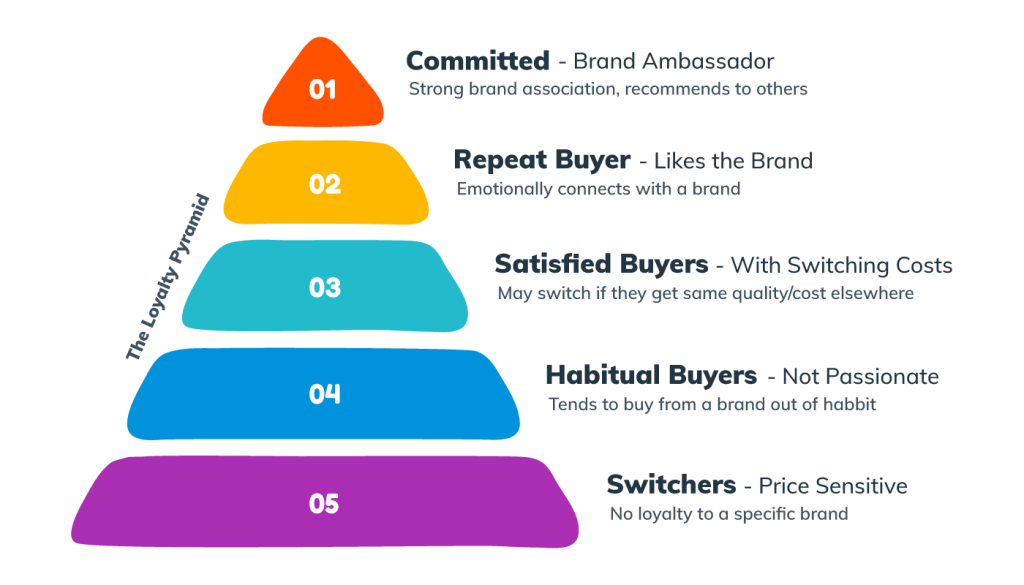
However, in reality, achieving absolute customer loyalty is very difficult. Due to the presence of numerous competitors in various sectors, it is rare for customers to use products from only one brand.
Why is Customer Loyalty Important?
According to experts, finding and acquiring new customers is five times more expensive than retaining loyal customers. New customers account for only 31% of total purchases, while returning customers make up over 50%. Therefore, retaining loyal customers is extremely important. In addition, loyal customers bring several benefits to businesses, such as:
- Increase Revenue and Reduce Costs: Loyal customers spend more than new customers, helping businesses save on marketing costs for acquiring new customers while significantly increasing sales.
- Create a Sustainable Revenue Stream: Loyal customers enhance the conversion rate to sales for the business.
- Cost Efficiency: Retaining loyal customers is cheaper than acquiring new ones. It is estimated that acquiring a new customer costs five times more than retaining an existing one.
- Improve Business Planning: Understanding loyal customers and listening to their honest feedback allows businesses to plan more effectively for marketing, production, and overall business strategy.
- Word-of-Mouth Marketing: Loyal customers are likely to recommend and share your business with others, providing free marketing and significantly boosting profits. This word-of-mouth marketing is invaluable and cost-effective.
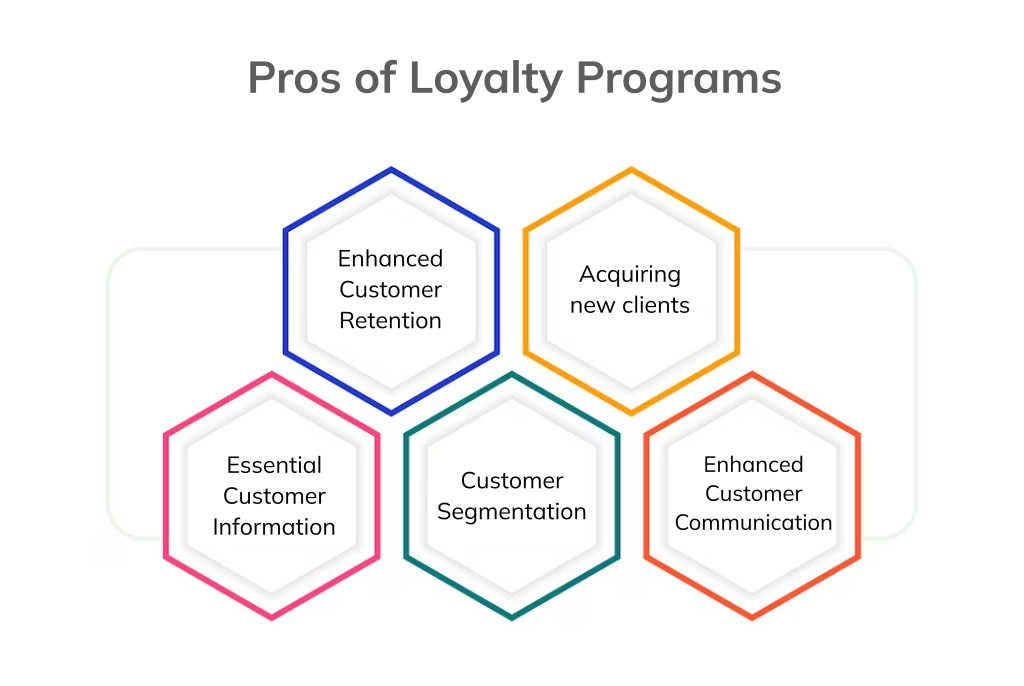
Factors Affecting Customer Loyalty
Satisfaction
This is the most fundamental factor that a business must fulfill for its customers. Customers must be satisfied with the products or services to trust and continue supporting the business as they develop over time.
Convenience
Convenience in purchasing products or using services significantly impacts customer loyalty. Only when a business has a professional customer service process will customers be inclined to return.
Creating a Sense of Difference
The most important factor in fostering loyalty is creating a sense of difference. Your business or brand must offer customers a unique and superior experience compared to other brands when they use your products or services.
Real-Life Example of Customer Loyalty
Now that you understand the concept of customer loyalty, let’s look at an example to illustrate how it works in practice.
A coffee shop offers a loyalty program where customers earn points for every purchase. Once they accumulate enough points, they receive a free drink or a discount on their next purchase. This encourages repeat visits, making customers feel valued and appreciated. As a result, they are more likely to choose this coffee shop over competitors.
Additionally, the coffee shop gathers feedback from loyalty members to improve the menu. By adjusting based on this feedback, the shop meets customer expectations, strengthens loyalty, and boosts positive word-of-mouth referrals.
>>> Learn More: 16 Successful Consumer Loyalty Program Examples For 2026
How to Build Customer Loyalty: Top Proven Strategies
Customer loyalty is the key driver behind a business’s growth. To increase customer loyalty, you can follow some of the methods shared by Trustify Reviews.
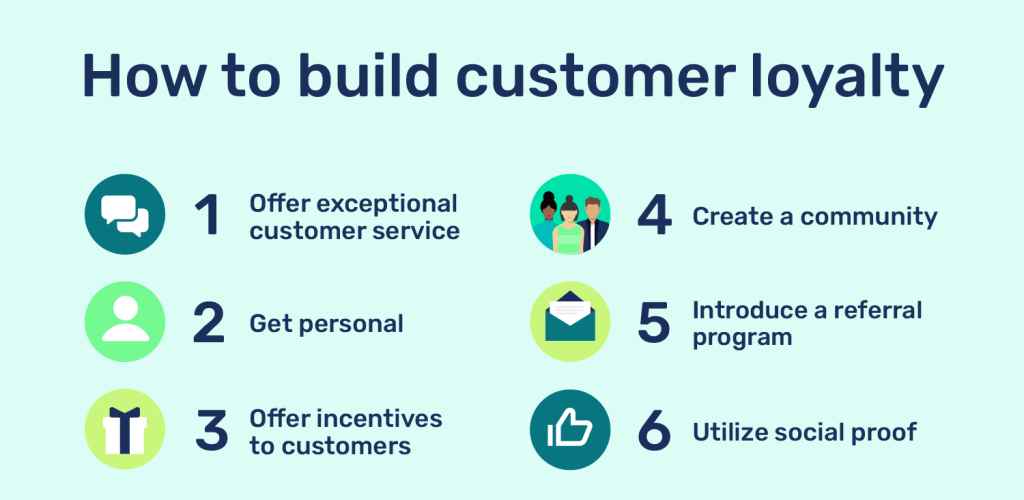
#1 Provide High-Quality Products/Services
High-quality products and services bring satisfaction to customers. Even long-term loyal customers may eventually leave if they feel they are not receiving value for their money.
A high-quality product or service builds trust and credibility in the eyes of customers. When customers trust in the quality of a business’s offerings, they are more likely to return and continue making purchases or using the services. Additionally, satisfied customers are more likely to recommend the brand to others, increasing the customer base.
#2 Building a Customer Loyalty Program
To effectively retain loyal customers, many businesses have developed customer loyalty programs with point systems that encourage repeat purchases and optimize service usage. Some common types of loyalty programs include:
- Points Card: Widely used in the food and restaurant industries, this method allows customers to accumulate points when they pay bills. Once they reach a certain point threshold, they can enjoy discounts on future purchases.
- Membership Card: Customers who join as members can accumulate points, and as they reach certain point milestones, their membership level is upgraded. Higher tiers come with more valuable perks compared to lower tiers.
- Paid Benefits: In some cases, customers can pay a one-time or annual fee to access exclusive benefits across all services and future orders.
#3 Personalize Customer Experience
Customer loyalty is built on trust, and to earn that trust, experts suggest approaching customers on a more personal level.
To personalize the customer experience, businesses need to manage customer data effectively to understand their habits, behaviors, and preferences. This enables the delivery of tailored messages. For example, on Valentine’s Day, you can send personalized messages and gifts to female customers (such as a 50% discount voucher). For male customers, you can suggest suitable gift options for them to give to their significant others.
#4 Listen to Customer Feedback
A business can only grow sustainably by meeting customer needs. Therefore, the most effective way to improve customer loyalty is to listen to their opinions and feedback. Moreover, you can create plans to solicit advice and survey customer opinions to improve areas of weakness and enhance the aspects of your service that customers are satisfied with.
Instead of waiting for feedback, businesses can proactively ask for customer reviews. Encouraging customers to share their experiences not only provides valuable insights but also demonstrates that you value their opinions. Actively seeking reviews helps identify areas for improvement and shows your commitment to enhancing the customer experience.
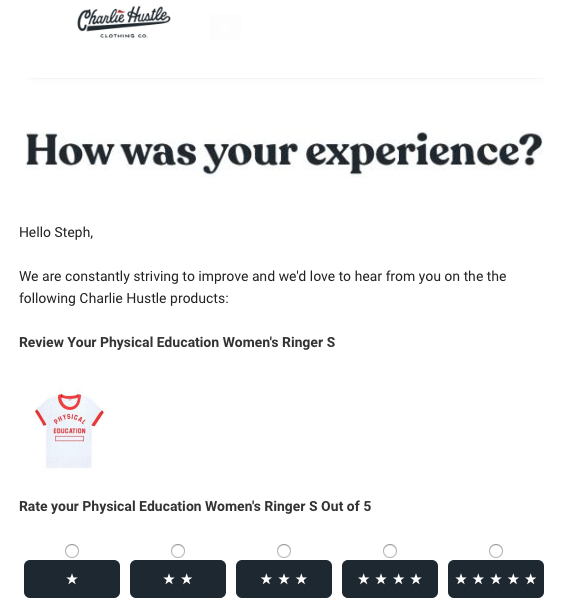
#5 Create a Brand Lover Community
Today, consumers may not trust advertisements, but they are likely to be persuaded when they hear others talk about their experiences with a product. Therefore, one of the most effective ways to convince customers to purchase a product or use a service is to build a community of loyal brand enthusiasts who share information.
Building a strong customer community helps businesses create deeper connections with their customers. Businesses can establish interactive communities on social media platforms like Facebook, Instagram, TikTok, and Twitter to encourage sharing and exchanges among their customers.
#6 Create Customer Rewards
Businesses can enhance customer loyalty by offering various rewards. Implementing promotional programs, providing discount vouchers, including gifts with purchases, or creating exclusive benefits for loyal customers are effective strategies. These rewards help retain existing customers and attract new ones, encouraging them to make more frequent purchases.
#7 Regularly Engage with Customers
Engaging with customers through various channels is crucial for building strong relationships. 64% of customers appreciate brands that frequently interact with them, making them more likely to return. Personalized emails based on customer behavior and special messages like birthday wishes or anniversary discounts can boost engagement.
Prioritizing customer service on social media is also effective. Customers prefer using messaging apps for quicker responses instead of waiting for call center or email replies.
Businesses are increasingly using chatbots to:
- Send post-purchase emails
- Provide order tracking support
- Survey customer experiences
- Offer discount codes and special programs
Metrics to Measure Customer Loyalty to the Brand
To assess customer loyalty, businesses can use various metrics. Each metric offers a unique perspective on how customers interact with your brand and products. Some common metrics include:
1. Customer Retention Rate (CRR)
Customer Retention Rate is a crucial metric that indicates a business’s ability to retain customers over a specific period. To calculate CRR, you need to determine:
- The number of customers at the beginning of the period (N).
- The number of customers at the end of the period, excluding new customers acquired during that period (E).
The formula to calculate CRR is:
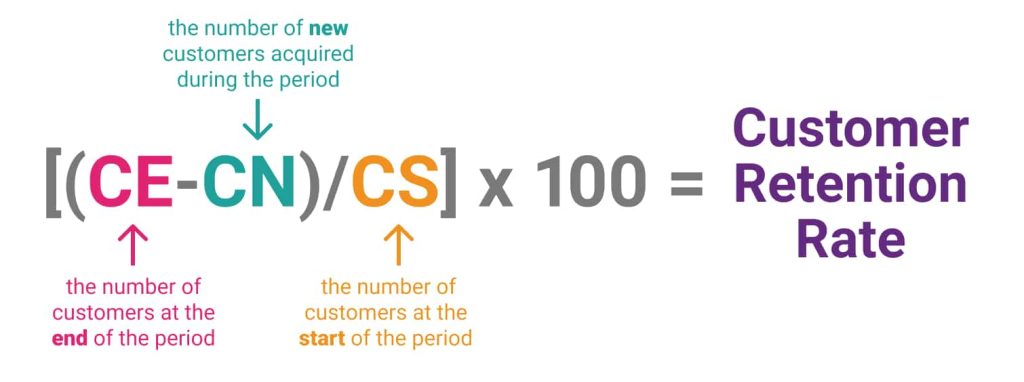
A higher CRR indicates better customer retention, which is a sign of high customer loyalty.
>>> Learn More: Best Strategies for Increasing Customer Retention
2. Purchase Frequency
Purchase frequency reflects how often customers return to buy your products or use your services. This analysis helps you understand if customers are committed to your brand over the long term. Tracking purchase frequency also allows businesses to identify their most loyal customers and offer them special incentives.
3. Net Promoter Score (NPS)
NPS is a method for measuring customer loyalty based on their likelihood to recommend your product or service to others. Customers are classified into three groups:
- Detractors (0-6 points): Unhappy customers who are likely to spread negative opinions.
- Passives (7-8 points): Satisfied but unenthusiastic customers who are unlikely to actively promote your brand.
- Promoters (9-10 points): Extremely satisfied customers who are highly likely to recommend your product to others.
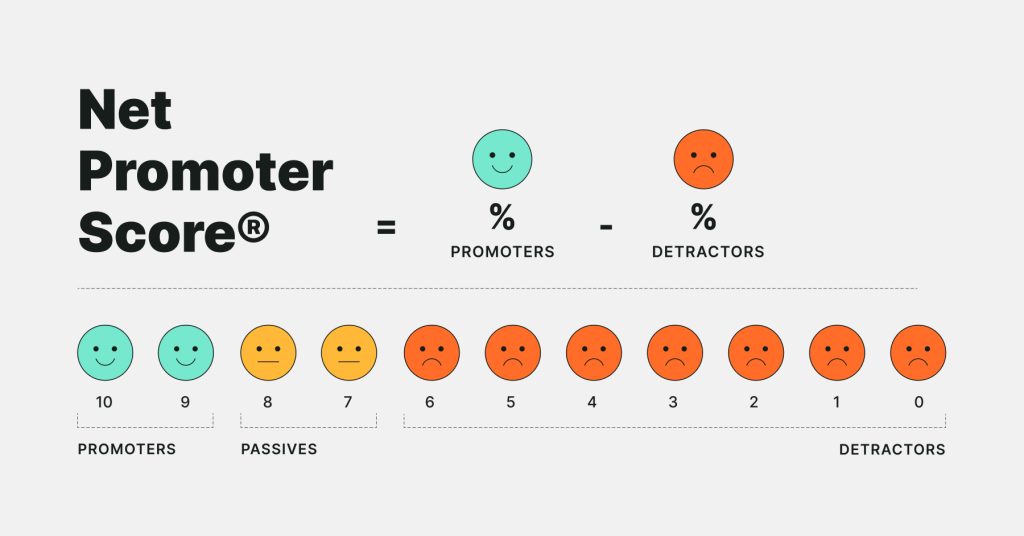
Wrap up
Customer loyalty is always the ultimate goal for every business. I hope that through this article, businesses will gain new strategies to maintain and enhance customer loyalty towards their products and brand, leading to greater growth and development.